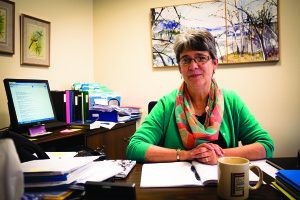Over the second weekend in October, representatives from the 98 member institutions of the National Network for the Lilly Fellows Program (LFP) in Humanities and Arts gathered at Belmont University in Nashville, Tennessee to attend the program’s twenty-fifth annual National Conference. Among them were Houghton College’s two designated representatives: Linda Mills Woolsey, Vice President for Academic Affairs and Dean of the College, and Stephen Woolsey, professor of English.
 While the organization hosts their yearly national conferences at member institutions all over the country, the Lilly Fellows Program in Humanities and Arts is based in Christ College at Valparaiso University, a Lutheran institution in Valparaiso, Indiana. LFP’s mission statement declares that it “seeks to renew and enhance the connections between Christianity and the academic vocation at church-related colleges and universities.” The organization attempts to achieve this goal through three major initiatives: the National Network, the Postdoctoral Fellows Program, and the Graduate Fellows Program. The Postdoctoral Fellows Program is a two-year residential fellowship specifically at Valparaiso University, while the Graduate Fellows Program supports ten fellows who hold bachelor’s degrees from LFP member institutions over three years as they pursue doctoral work in the humanities and arts. Two past graduate fellows are Houghton alumni: Kyle Vitale (‘09) and Gerard Gentry (’10).
While the organization hosts their yearly national conferences at member institutions all over the country, the Lilly Fellows Program in Humanities and Arts is based in Christ College at Valparaiso University, a Lutheran institution in Valparaiso, Indiana. LFP’s mission statement declares that it “seeks to renew and enhance the connections between Christianity and the academic vocation at church-related colleges and universities.” The organization attempts to achieve this goal through three major initiatives: the National Network, the Postdoctoral Fellows Program, and the Graduate Fellows Program. The Postdoctoral Fellows Program is a two-year residential fellowship specifically at Valparaiso University, while the Graduate Fellows Program supports ten fellows who hold bachelor’s degrees from LFP member institutions over three years as they pursue doctoral work in the humanities and arts. Two past graduate fellows are Houghton alumni: Kyle Vitale (‘09) and Gerard Gentry (’10).
“One of the best things about going to the most recent conference was that I got to see Kyle Vitale and talk to him about his experience,” said Mills Woolsey. “He talked about the Lilly Graduate Fellows program as being a lifeline during such a discouraging time for students in graduate school in the arts and humanities.”
Mills Woolsey, having represented Houghton at conferences off and on since 2001, was elected to a four-year term on the National Network Board for LFP last year. As a board member, she attended discussions and panels at the 2015 conference, but also attended a day-and-a-half-long board meeting. The LFP National Board, which is composed of twelve members, meets twice a year. Meetings are packed with discussions in which they decide what initiatives LFP will fund in the coming year, what themes they will pursue for future conferences, and what prospective institutions they might accept into the network.
Although Houghton maintains memberships in other Christian national organizations, including the Council for Christian Colleges & Universities and the Christian College Consortium, LFP stands out as a Christian network that crosses denominational lines.
“Lilly overlaps with CCCU in that it does include some evangelical colleges, but it’s broader,” said Mills Woolsey of the organization. “You get to interact with faculty from Roman Catholic colleges, Lutheran colleges, United Methodist and Presbyterian colleges, and some of the Baptist colleges. It’s a more varied pool, but it’s amazing how much we share in common.”
The commonalities in these academics’ commitment to their faith and vocation are celebrated at LFP’s annual National Conference. This year’s conference, entitled “Created for Creativity: Music, Culture and Faith,” took place from October 9 through 11. In conjunction with Belmont’s strong music program, the conference focused on the theology of creativity. Participants had the opportunity to network by exploring Nashville together, sharing meals, and attending sessions that featured speakers who specialize in some aspect of the music profession. These speakers included the director of Belmont’s Religion & Arts Program, a music professor and choral director from Auburn University, a record label executive, and an award-winning songwriter and performer.
While each conference has its own unique theme, with past conferences discussing such diverse topics as racial justice and urban issues, music and worship is always an important part of the National Conference. According to Mills Woolsey, Roman Catholic and Protestant members alike share in ecumenical worship services together that are especially meaningful, and inspire a sense of fellowship among its participants.
This fellowship is ultimately what makes LFP special as a National Network, whether members experience it through worship, conversation, or a speaker’s message. Mills Woolsey affirmed this, saying:
“As a speaker, you want to draw your audience into a conversation that discusses what are our shared beliefs, and what are our shared problems and concerns, rather than focusing on the things that divide us.”
In the midst of a challenging time for higher education in the arts and humanities, LFP allows schools like Houghton to continue to grow in their mission, while connecting with other like-minded institutions. Fortunately, Houghton’s strong and lasting connection with LFP has and will continue to benefit the college’s lasting legacy in the liberal arts.
